#talk about georgians
Text
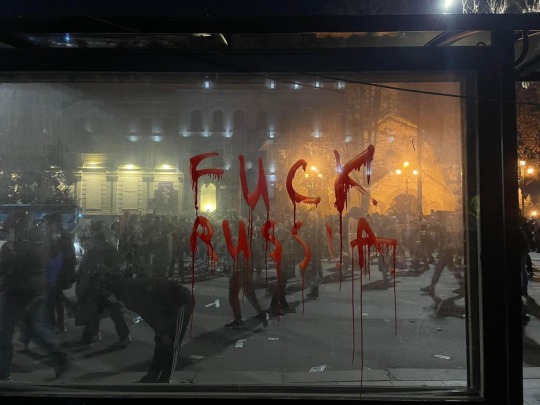
Tbilisi, Sakartvelo | 07.03.2023
706 notes
·
View notes
Photo

Miniven YEREVAN TO TBILISI
http://armenian-tourism.ru/marshrutka-tbilisi-yerevan.php
1 note
·
View note
Text

⬆️autism stare⬆️
#the look she gives you when#he wants to talk about butterflies or 27th century georgian hyperfolk#doctor who#eighth doctor
290 notes
·
View notes
Text
When Thomas and Kitty get together (yes, I’m at the point where I’m saying when rather than if), they’re going to be super sappy and annoying, to the point where it gets weird for the other ghosts and probably Alison too.
So I’m just imagining that Pat gets all the other ghosts together for a special meeting, where he talks very vaguely about how “some people’s” PDA is making everyone else uncomfortable.
And then you’ve got Thomas and Kitty, completely oblivious, sitting there like:

#mari speaks#thomas x kitty#kitty x thomas#kitmas#gorgeous georgians#bbc ghosts#thomas thorne#kitty higham#eventually thomas is like ‘are you talking about us???’#and then julian is like ‘well who the hell else would we be talking about???’#idk i just think this would be funny
132 notes
·
View notes
Text
fics where havers somehow gets up in the mix with the button house crew are always good bc mwah capvers but it's also always funny to see him interact with the other ghosts. it's like daniel vs the cooler daniel. the ghosts inexplicably love him and dunk on cap. maybe it's just the novelty of a new person but they're always like oh a nice soldier! such a gentleman, so polite! not like you, captain. big "julia you have a lovely home, jacob you could do better" energy.
#the way all the ghosts take to him is always funny and charming to me#ah my new 8 best friends. also im hopelessly in love with cap and we havent figured our shit out#but there's a nice georgian woman trying to show me around and a northern guy who wants to talk about sports#the complete panic and overwhelmed feeling of showing up wanting to get with ur crush only to be inundated with his whole extended family#its so funny#bbc ghosts
20 notes
·
View notes
Text
save me italian/german pairs podium sweep italian/german pairs podium sweep please save me
#if the georgian team medals i might turn to violence#my dream podium is c/m h/v h/k#in like any order#but idk if h/k are up for that again#and two italian teams would also eat#euros 2024#figure skating#fs season 2023/24#si talks about figure skating
14 notes
·
View notes
Text
The face Irakli makes when learning more about Merab and his tattoo...

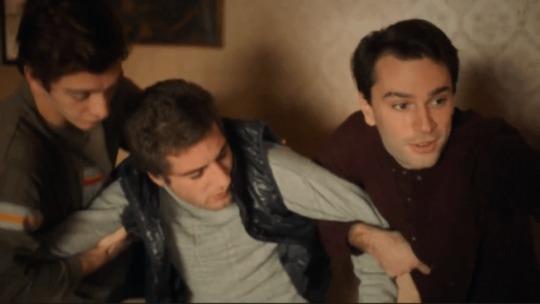

...and the face Merab makes when realizing someone is interested in his body

And Then We Danced / და ჩვენ ვიცეკვეთ (2019) dir. Levan Akin
#Irakli is just so excited about his little discovery#and a bit too drunk to think whether revealing such straightforward curiosity as to comment on another guy might be considered improper#at this point he can't suppose Merab is anything but a straight guy and yet he shows interest in him#I just think it's cute#and so very natural: now Merab might just ignore the whole thing as that's just a drunk colleague talking nonsense... or he might not#and then we danced#atwd#და ჩვენ ვიცეკვეთ#merab x irakli#levan gelbakhiani#bachi valishvili#levan akin#a potem tańczyliśmy#georgian movie#gay movie
8 notes
·
View notes
Text
does anyone else from the south put lemonheads in their coke that was such a big thing in my hometown
#txt#ik abt the peanuts in coke im talking about LEMONHEADS. tha candy. ive asked other georgians abt it b4#and theyve been like ew no. but everyone in my hometown did it. they sold coke bottles and lemonheads together at the local skating rink#as like a combo deal.
6 notes
·
View notes
Text
I hate the US and NATO just as much as the next guy but spreading Russian propaganda is just not right. Like. Straight up provably false and uninformed propaganda. I DO REALIZE I AM ON TUMBLR BUT STILL.
#not only do you hurt Ukrainians#Russians too#Belarusians#kazakh people#armenians#Georgians#every single country that borders Russia#and obv other ethnicities in Russia who aren't Russian#and it's not like Ukrainians aren't on the internet#you can ask them about all this shit directly#help#*anti US* and only talks about the war from the US perspective#literally doesn't consider anything other than what the US does and how it affects the US#um. sure. you don't care about Ukraine you care about shitting on the US where it is not even the main player 😭#sooo much for internationalism#ask the people deported to Russian far east if the destruction of mariupol is just American lies about Russian atrocities#holy shit
12 notes
·
View notes
Text
Miscellaneous Headcanons
I feel the need to clairify that Nabooru is generally kind in that she cares about others, especially those she's friends with, but she is miserably, terribly bad at saying as much. My girl is working with a -4 charisma stat. It's one of the reasons she and Ganondorf were able to put up with each other for so long. He needed her to stay with the Gerudo, which she was going to do anyway, and she needed him to smooth things over when hitting things wasn't going to cut it. She misspeaks all the time and can come across as very callous, but when push comes to shove, she'll have her allies' backs.
#headcanons#out of character#I once described them as the new yorker versus the georgian (united states)#the new yorker will cuss you out for having a flat#but will drive you wherever you need to get it fixed#the georgian will talk up a storm about praying for you#and leave you in the middle of nowhere to get eaten by corn
3 notes
·
View notes
Text
It’s always so wild seeing someone with apparently very consistent political views couched in that sort of high level/reasoned academic voice but once you start parsing the words it’s absolute gibberish….like bestie what do you THINK you’re saying rn.
#I’m not talking about jargon btw. I think jargon and shorthand is helpful and has its place#this is more like people who write paragraphs to anons like#great question! so my first step would to be to read The Violent Frog by Stamnar Retributionist#and then you can understand how Small Georgianism intersects with Vanilla Men in a way#that produces Socialist Ideals Under Brushfires#like full respect my guy but you might be in a cult#mine#text post#I hope none of those joke examples are real#or adjacent to real things lmao
1 note
·
View note
Text
I really hope Jack Edwards chokes. "Oh look we made Dostoevsky number one bestseller on Amazon!" as if that fucking guy needed any hype. Maybe you can spend all this time and energy promoting books and authors that truly are not represented? I don’t know, make a video on Georgian literature, spend hours trying to find at least one English translation of the biggest Lithuanian authors? Of course, it’s going to be hard, all of the money was spend on English translations of Russian authors and all of us had only last 33 years trying to do anything to promote our culture while you all were simping for chauvinists, who hated the bare existence of us. Google at least the names of prominent Polish and Latvian authors. What are their names? What were they writing about? Could they afford to write about some highly intellectual suffering while their nations were balancing between life and death? Read the names of modern Ukrainian writers that were killed in the last 2 years. Who killed them? What would they think of Dostoevsky? Were they the "trembling beast" or "did they have the right"? Literature does teach a lot and for some reason the countries that were (are) under Russian attacks don’t like Dostoevsky, why his philosophical thought is so pathetic in our eyes? Do some research, then we’ll talk.
285 notes
·
View notes
Note
the ghosts can only touch clothing belonging to other ghosts so thomas is holding kitty's shoe!!!! look at the colour of it!!! they're doing cinderella by the looks of it?
Yes!! They’re doing Cinderella and Thomas is going to be Kitty’s Prince Charming!!!
This episode is going to kill me 😭
#ask#anonymous#bbc ghosts spoilers#ghosts spoilers#kitty x thomas#thomas x kitty#gorgeous georgians#thomas thorne#kitty higham#of course we don’t know for sure what’s happening#but we were talking about this on the mat discord server#and we’re all freaking out 😆#I know this ep is going to be mainly about pat#but these two are probably going to be the highlight for me
34 notes
·
View notes
Text
Cold Iron in folklore, fiction, and RPGs
'Gold is for the mistress—silver for the maid!
Copper for the craftsman cunning at his trade.'
'Good!' said the Baron, sitting in his hall,
'But Iron—Cold Iron—is master of them all!'
— Rudyard Kipling, “Cold Iron”
Folklore

Drudenmesser, or "witch-knife", an apotropaic folding knife from Germany
The notion that iron (or steel) can ward against evil spirits, witches, fairies, etc is very widespread in folklore. You hang a horseshoe over your threshold to deny entry to evil spirits, you carry an iron tool with you to make sure devils won't assault you, you place a small knife under the baby's crib to ward it from witches, and so on. Iron is apotropaic in many many cultures.
In English, we often come across passages that refer to apotropaic cold iron (or cold steel). "All uncouth, unknown Wights are terrifyed by nothing earthly so much as by cold Iron", says Robert Kirk in 1691, which I believe is the earliest example. "Evil spirits cannot bear the touch of cold steel. Iron, or preferably steel, in any form is a protection", says John Gregorson Campbell in 1901.
Words
So what is cold iron? In this context, it’s just iron. The “cold” part is poetic, especially – but not only – if we’re talking about either blades (or swords, weapons, the force of arms) or manacles and the like. It just sounds more ominous. There are “cold yron chaines” in The Fairie Queene (1596), and a 1638 book of travels tells us that a Georgian general (in the Caucasus) vowed “to make the Turk to eat cold iron”.
Green’s Dictionary of Slang defines “cold iron” as a sword, and dates the term to 1698. From 1725 it appears in Cant dictionaries (could this sense be thieves’ cant, originally? why not, plenty of words and expressions started as underworld slang and then entered the mainstream), and from ~1750 its use becomes much more common.
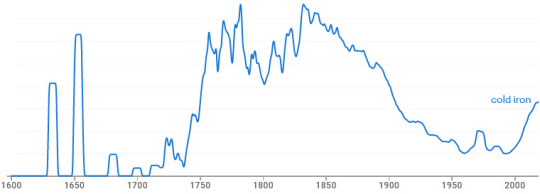
NGram Viewer diagram for 1600-2019.
In other contexts, cold iron is (surprise!) iron that’s not hot. So let’s talk a bit about metallurgy.
Metals
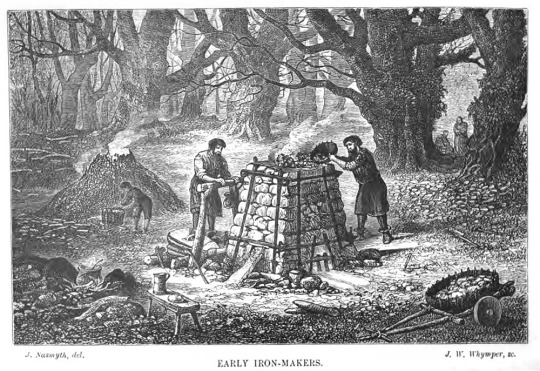
In nature, we can find only one kind of iron that’s pure enough to work with: meteoritic iron. It has to literally fall from the sky. Barring that very rare occurrence, people have to mine the earth for iron ore, which is not workable as is. To separate the iron from the ore we have to smelt it, and for that we need heat, in the form of hot charcoals. Throwing the ore on the coals won’t do much of anything, it’s not hot enough. But if we enclose the coals in a little tower built of clay, leaving holes for air flow, the temperature rises enough to smelt the ore. That’s called a bloomery.
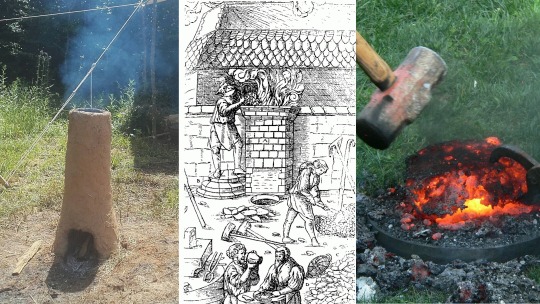
clay bloomery / medieval bloomery / beating the bloom to get rid of the slag
What comes out of the bloomery is a bloom: a porous, malleable mass of iron (that we need) and slag (byproducts that we don’t need). But now we can get rid of the slag and turn the porous mass to something solid, by hammering the hot bloom over and over. And once the slag is off, by the same process we can give it a desired shape in the forge, reheating it as needed. This is called “working” the iron, hence “wrought iron” objects, i.e. forged.
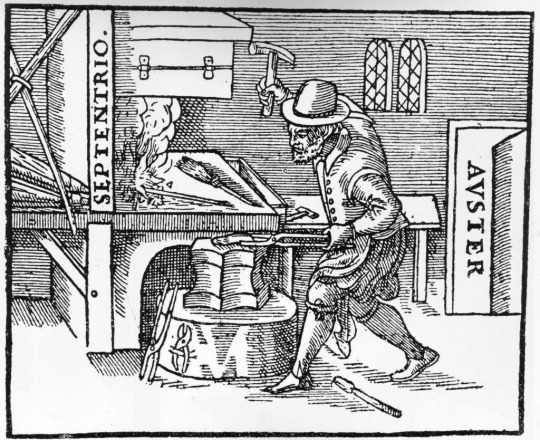
a blacksmith in his forge, with bellows, fire, and anvil (English woodcut, 1603)
This is the lowest-tech version, possibly going back to ~2000 BCE in Nigeria. If we add bellows, the improved air flow will raise the temperature. So smelting happens faster and more efficiently in the bloomery, and so does heating the iron in the forge, making it easier to work with. And that’s the standard process from the Iron Age all through the middle ages and beyond (although in China they may have skipped this stage and gone straight to the next one).
If we make the bloomery bigger and bigger, with stronger and stronger bellows, we end up with a blast furnace, a construction so efficient that the temperature outright melts the iron, and it’s liquified enough to be poured into a mould and acquire the desired shape when it cools off. This is “cast iron”.
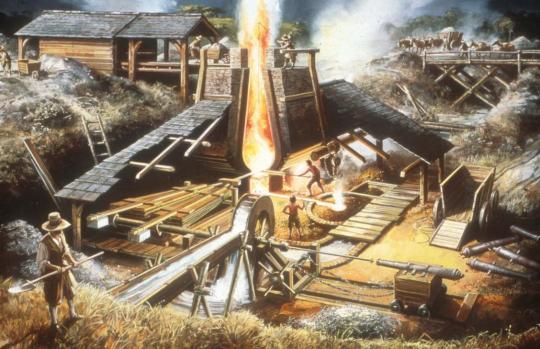
a blast furnace
So in all of this, what’s cold iron? Well, it’s iron that went though the heat and cooled off. (No heat = no iron, all you got is ore.) If it came out of a bloomery, or if it wasn’t cast, it’s by definition worked, hammered, beaten, wrought, and that happened while it was still hot.
Is there such a thing as “cold-wrought” iron? No. In fact, “working cold iron” was a simile for something foolish or pointless. A smith who beats cold iron instead of putting it in the fire shows folly, says a 1694 book on religion, so you too should choose your best tools, piety and good decorum, to educate your children and servants, instead of beating them. When Don Quixote (1605) declares he’ll go knight-erranting again, Sancho Panza tries to dissuade him, but it’s like “preaching in the desert and hammering on cold iron” (a direct translation of martillar en hierro frío).
Minor work can be done on cold iron. A 1710 dictionary of technical terms tells us that a rivetting-hammer is “chiefly used for rivetting or setting straight cold iron, or for crooking of small work; but ’tis seldom used at the forge”. Fully fashioning an object out of cold iron is not a real process – though a 1659 History of the World would claim that in Arabia it’s so hot that “smiths work nails and horseshoes out of cold iron, softened only by the vigorous heat of the sun, and the hard hammering of hands on the anvil”. [I declare myself unqualified to judge the veracity of this statement, let's just say I have doubts.] And there is of course such a thing as “cold wrought-iron”, as in wrought iron after it’s cooled off.
Either way, in the context of pre-20th century English texts which refer to apotropaic “cold iron”, it’s definitely not “cold-wrought”, or meteoritic, or a special alloy of any kind. It’s just iron.
Fiction
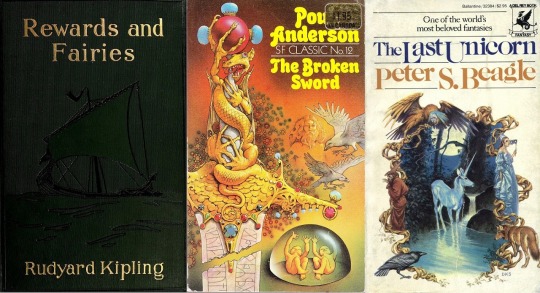
The old superstition kept coming up in fantasy fiction. In 1910 Rudyard Kipling wrote the very influential short story “Cold Iron” (in the collection Rewards and Fairies), where he explains invents the details of the fairies’ aversion to iron. They can’t bewitch a child wearing boots, because the boots have nails in the soles. They can’t pass under a doorway guarded by a horseshoe, but they can slip through the backdoor that people neglected to guard. Mortals live “on the near side of Cold Iron”, because there’s iron in every house, while fairies live “on the far side of Cold Iron”, and want nothing to do with it. And changelings brought up by fairies will go back to the world of mortals as soon they touch cold iron for the first time.
In Poul Anderson’s The Broken Sword (1954), we read:
“Let me tell you, boy, that you humans, weak and short-lived and unwitting, are nonetheless more strong than elves and trolls, aye, than giants and gods. And that you can touch cold iron is only one reason.”
In Peter S. Beagle’s The Last Unicorn (1968) the unicorn is imprisoned in an iron cage:
“She turned and turned in her prison, her body shrinking from the touch of the iron bars all around her. No creature of man’s night loves cold iron, and while the unicorn could endure its presence, the murderous smell of it seemed to turn her bones to sand and her blood to rain.”
Poul Anderson would come back to that idea in Operation Chaos (1971), where the worldbuilding’s premise is that magic and magical creatures have been reintroduced into the modern world, because a scientist “discovered he could degauss the effects of cold iron and release the goetic forces”. And that until then, they had been steadily declining, ever since the Iron Age came along.
There are a million examples, I’m just focusing on those that would have had a more direct influence on roleplaying games. However, I should note that all these say “cold iron” but mean “iron”. Yes, the fey call it cold, but they are a poetic bunch. You can’t expect Robin Goodfellow’s words to be pedestrian, now can you?
RPGs
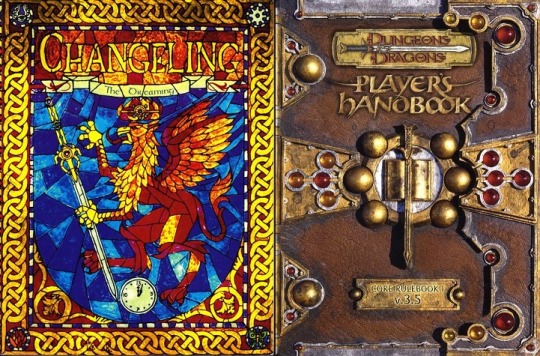
And from there, fantasy roleplaying systems got the idea that Cold Iron is a special material that fey are vulnerable to. The term had been floating around since the early D&D days, but inconsistently, scattered in random sourcebooks, and not necessarily meaning anything else than iron. In 1st Edition’s Monster Manual (1977) it’s ghasts and quasits who are vulnerable to it, not any fey creature. Devils and/or fiends might dislike iron, powdered cold iron is a component in Magic Circle Against Evil, and “cold-wrought iron” makes a couple of appearances. For example, in AD&D it can strike Fool’s Gold and turn it back to its natural state, revealing the illusion.
Then Changeling: The Dreaming came along and made it a big deal, a fundamental rule, and an anathema to all fae:
Cold iron is the ultimate sign of Banality to changelings. ... Its presence makes changelings ill at ease, and cold iron weapons cause horrible, smoking wounds that rob changelings of Glamour and threaten their very existence.... The best way to think about cold iron is not as a thing, but as a process, a very low-tech process. It must be produced from iron ore over a charcoal fire. The resulting lump of black-gray material can then be forged (hammered) into useful shapes.
— Changeling: The Dreaming (2nd Edition, 1997)
So now that we know how iron works, does that description make sense? Well, if we assume that the iron ore is unceremoniously dumped on coals, it does not. You can’t smelt iron like that. If we assume that a bloomery is involved even though it’s not mentioned, then yes, this is broadly speaking how iron’s been made since the Iron Age, and until blast furnaces came into the picture. But the World of Darkness isn’t a pseudo-medieval setting, it’s modern urban fantasy. So the implication here is that “cold iron” is iron made the old way: you can’t buy it in the store, someone has to replicate ye olde process and do the whole thing by hand. Now, this is NOT how the term “cold iron” has been used in real life or fiction thus far, but hey, fantasy games are allowed to invent things.
Regardless, 3.5 borrowed the idea, and for the first time D&D made this a core rule. Now most fey creatures had damage reduction and took less damage from weapons and natural attacks, unless the weapon was made of Cold Iron:
“This iron, mined deep underground, known for its effectiveness against fey creatures, is forged at a lower temperature to preserve its delicate properties.”
— Player’s Handbook (3.5 Edition, 2003)
Pathfinder kept the rule, though 5e did not. And unlike Changeling, this definition left it somewhat ambiguous if we’re talking about a material with special composition (i.e. not iron) or made with a special process (i.e. iron but). The community was divided, threads were locked over this!
So until someone points me to new evidence, I’ll assume that the invention of cold iron as a special material, distinct from plain iron, should be attributed to TTRPGs.
#long post#cold iron#d&d#Changeling: The Dreaming#World of Darkness#Peter S. Beagle#The Last Unicorn#Rudyard Kipling#Poul Anderson#The Broken Sword#how to rogue#pathfinder#rogues in fiction#Operation Chaos#rogue superstitions#words of the trade#thieves' cant#ad&d#d&d history#1st edition#fey#3.5#fluff#trs
338 notes
·
View notes
Text

this podium is not a want its a need
#as long as its these teams i dont care about placements#no georgians please ill kill myself#also pls ignore the bad quality idk why tumblr hates me#figure skating#worlds 2024#fs season 2023/24#si talks about figure skating
10 notes
·
View notes
Text
Kit to Ty
Ty,
I need someone to talk to and I don’t want it to be Julian or Emma. Or Jem or Tessa. So it’ll have to be you. Which means I can’t ever send this and you can’t ever read it. I’ll burn it in the garden when I’m done writing it so I’m not tempted to send it.
The gardens here are really excellent, by the way. I guess you know that since you’ve been here. There’s an old Georgian greenhouse, and a little pond with lilies and frogs and benches to watch them, and a walled garden, and it’s just very nice to walk around here with Mina. I never had a sister or brother before, you know that, but being with Mina makes me realize more about how you felt about Livvy. Still feel about Livvy I guess. I’m not saying I forgive you. Just maybe I understand more.
Blackthorn Hall is still being restored, of course, and there are faeries everywhere doing the restorations. They’re brownies, apparently, and even though they aren’t doing anything that interesting—weeding and carrying wheelbarrows of dirt and whatever—I can’t stop watching them. I have hardly seen any faeries at all since—well, since we were in that battle with them. I guess I didn’t realize how strictly I was being kept apart from them. Until now.
I should really stay away from them, because every time I get close enough for them to talk to me, they do something to freak me out. The head builder, this guy Round Tom— he’s not even that round, honestly — anyway the first time Round Tom saw me he did a little thing where he jumped in a circle and made some odd gestures in the air, and then bowed in my direction. I just turned around on my heel and walked off in the other direction like I had just remembered I forgot something.
And then General Winter, like Kieran’s General Winter, was there helping out—Julian says he’s there to keep all the workers in line since they are scared of General Winter but not Round Tom—and he knew I was the First Heir. Like the Riders did.
The Riders whose horses I made disappear. Or something. I don’t know if they ever came back. No one seems to know.
I tried to pretend I didn’t hear General Winter either but we were just out in the open and it would have been way too obvious. So when he addressed me as First Heir all I could think of to say was, “That’s me. Or at least that’s what I’ve been told.”
“If you’ve been told,” he said, “then it is true, since we do not lie.”
I wanted to say buddy, I worked at the Los Angeles Shadow Market for years. Faeries do all kinds of sketchy stuff. Instead I just said, “I don’t really know what I’m supposed to do about it.”
General Winter watched me with this thoughtful look on his face, and said, “You need do nothing about it, yet. Indeed, at this moment that might be the wisest course of action. For things are strange in Faerie.”
“What do you mean?” I said.
“There are disturbances,” he said slowly. “Rumors swirl about the Seelie Court. And Mother Hawthorn walks again.”
BEfore I could ask him what any of that meant, Round Tom came rushing over. “Cousins.” (I had forgotten faeries sometimes addressed each other like that, and it gave me a little shiver, like he was saying, you are one of us.) “I have found something. Please come with me.”
He led us around to one of the big plane trees. A little ways away from the trunk was a huge hole, and then on the other side of the tree were two sawhorses across which balanced a coffin.
At least I think it was a coffin. It was really busted up, half-rotted, cracked everywhere, caked in dirt. It was obviously the thing that had come out of the hole.
“A tomb?” said General Winter as we got closer, but Round Tom was shaking his head.
“We would not have disturbed a tomb,” said Round Tom. “But none lie buried here. Only magic, of a dark and powerful kind.” He stepped back. “Look inside.”
I came closer. There was indeed a bunch of random stuff inside the coffin. It looked like—well, you know how old Egyptian pharaohs were buried with all their belongings? It was like that, I assume for a Shadowhunter, except the belongings were a weird assortment. It was dirty and falling apart and mostly just junk—papers and little jars and bits of fabric and the hilt of a sword with no blade, that kind of thing.
“How old is it?” I said, and Round Tom reached it and fished out a liquor bottle. The label was pretty faded and ripped but it was a printed label, in a Victorian style. I wondered if Jem or Tessa would have any guess whose stuff it could be.
“You said there was magic here?” I said.
“Dark magic,” Round Tom said gravely. “Wild magic.”
“The curse?” said General Winter.
Round Tom’s expression cleared and he shrugged. “Perhaps not. It’s actually much less demonic in nature than the curse on the house. But emanating from the foot of an unremarkable tree it bore exploration. There are two items that might be of further interest.”
He cleared away some of the mess and revealed a scabbard. It was a very nice scabbard. Sorry, that doesn’t really capture it. A very very nice scabbard. It needed some cleaning up, but it was obviously beautiful and, I’m sure, valuable. It was steel but covered in gold inlay all over in the shape of leaves and birds. There were some runes on it, too, so it was definitely a Shadowhunter’s at some point.
“Nice,” I said.
“It is more than ‘nice,’” General Winter said. “It is clearly the work of Lady Melusine herself. See how it has not deteriorated at all?”
Round Tom looked important. “And yet it is the less interesting of the two pieces,” he said. With a great dramatic gesture that he had clearly practiced ahead of time, he pushed all of the junk to one side in the coffin, leaving—
“Is that…a gun?” I said.
“One of those mundane weapons, yes,” said Round Tom. He picked it up as though it might go off, though it was rusty and covered in dirt. It was a revolver. It didn’t look any different than revolvers from a million gangster movies, or Westerns—I guess if I were really sending this to Ty I would have to explain what a Western was.
Anyway the big difference was this gun was covered in etchings and runes and words and was obviously magic af. (Which means . . . oh, never mind what it means.)
“But Shadowhunters don’t use guns,” I said.
“They never have,” General Winter agreed. He picked up the gun with a surprising amount of familiarity, and sighted along it in the direction of a nearby tree. He tried to fire and it just clicked — the cylinder didn’t even turn.
“Rusted shut, probably,” said Tom. General Winter handed it to me to look at. I’m not good enough with runes to know any of the ones that were on it. I pointed it at the same tree, kind of as a joke, kind of just to feel how heavy it was, and pulled the trigger, and there was a huge BANG and a bunch of wood splinters exploded from the tree.
My arm kicked back from the force of the shot. And we all stared. My ears were buzzing, but I thought I heard Round Tom say something to General Winter. I’m pretty sure the words First Heir were in there.
Certainly when I looked at them again, at Round Tom and General Winter, their expressions were guarded. Closed.
“Perhaps we should take this item inside and see if the other Nephilim recognize anything about it,” General Winter said flatly.
“I’m sure it just only works for Shadowhunters,” I told General Winter, but he just gave me kind of a troubled look and said nothing. “Anyway. I’ll bring it in.”
I could feel General Winter and Round Tom watching me as I ran across the lawn and into the house. Jem and Tessa were sitting on a couch in the drawing-room, watching Mina coloring with crayons on some butcher paper.
The moment I came in holding the gun both of them looked utterly shocked. Tessa got to her feet and moved between me and Mina. I told myself she was standing between the gun and Mina, but it still felt rotten.
“What—” said Jem, standing up, but he didn’t finish the sentence. He just stared at me, and the gun.
“Round Tom found it in the garden,” I said. “Is this a gun for Shadowhunters?” I could feel my voice getting tighter. “Shadowhunters don’t use guns.”
“Long ago, Christopher Lightwood tried to create a gun that Shadowhunters could fire,” said Tessa. She was still staring at the gun.
“It was in a coffin,” I said. “With a bunch of other stuff. A broken sword, and a fancy scabbard.”
“I wondered what he did with it,” said Jem. He? Who was he?
Jem and Tessa exchanged a look. “The gun belonged to my son James,” she said. I felt kind of sick. Tessa hardly ever talked about her children with Will. “He was the only one who could use it. It would not fire in anyone’s hands but his.”
“I fired it,” I said.
They both looked stunned, and not in a good way.
“You are very special, Kit,” Jem said. “You are the First Heir. We don’t yet know the extent of how that power works in you.”
“Or perhaps it is just that he has faerie blood,” said Tessa.
I could have said that it definitely wasn’t just faerie blood because General Winter couldn’t use the gun and he doesn’t only have faerie blood, he has a full faerie body with faerie organs and everything. But I didn’t say anything. I just felt a weird feeling in my stomach. I said I would put the gun away and not use it, and Jem and Tessa seemed to feel that was the best thing I could do, and Mina piped up and said “Gun!” and then I felt like the worst person on earth.
So now it’s late and I’m up writing this letter to you that I am going to burn when I’m done, because I can’t sleep. Because I don’t want to be the only person in the world who can fire a magic gun. I don’t want General Winter to straighten up when I’m nearby like I outrank him. I don’t want any of this. I had five minutes where I got to think, oh neat, I found this cool-looking gun and I bet there’s a story behind it, I wonder if they’ll let me keep it or if it needs to go to a museum or something. And then I fired it and instantly—just another thing that’s weird about me.
Good night, Ty. I’ll never send this, and you’ll never read it.
Kit
4K notes
·
View notes